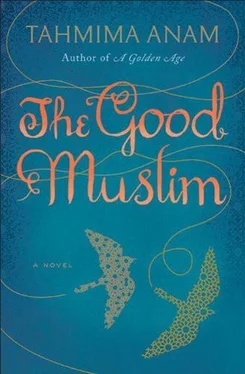It was true. For months Silvi had kept her vigil, as the people gathered to hear Sohail speak. She saw the men and women sitting in columns, side by side. She couldn’t hear his words, but from her rooftop she saw his rooftop, and the bodies that swayed with the cadence of his voice.
And while Silvi watched Sohail, Maya watched Silvi. She saw the parting of Silvi’s curtains whenever Sohail appeared. She saw the black outline of her, hanging up her washing on the rooftop so she could peer across at Sohail and his followers. One day, after the sermon had ended and the Azaan been recited, Maya saw Silvi open her gate and cross the road. Silvi caught the eye of a young woman on her way out. Come here, she said, motioning with her hand. The woman looked very little like a religious supplicant — she wore a plain salwaar-kameez and didn’t even cover her head. Maya stood behind her own gate and listened to the exchange.
‘What goes on in that house?’ Silvi asked.
The woman smiled. ‘He is a very wise man,’ she said. ‘A wise and humble man.’ And she gazed directly into Silvi’s eye, and Maya knew that Silvi was being told everything she needed to know, because Silvi must remember the hypnotic quality of Sohail’s voice, and the way he made people want to believe everything he said, and the deep conviction he brought to every word, and the rising colour in his cheek, and the way he raised his hand, gently, as if he were about to caress you, and the stillness of the rest of him, all his energy, his power, channelled into his voice, its current swift, and long, and steady.
What exactly was he preaching, Silvi wanted to know.
‘It cannot be explained,’ the woman said, looking more and more as if she were in love, ‘it cannot be explained.’
And the woman left Silvi at the bungalow gate, treading confidently away, taking with her a piece of that river voice, that little piece of astonishment. Maya was about to confront her, to warn her away, to tell her that she had already broken Sohail’s heart once, and that she no longer had a claim to him. But before Maya could act, Silvi climbed up the ladder, surprisingly nimble in her cloak. Maya never knew what happened on that roof, what words were exchanged by Silvi and her brother. She tried to imagine it and she could conjure up only this: that Silvi approached Sohail, still kneeling from the prayer, and said, ‘You remember the slave Bilal. He was punished by Ummayah for becoming a Muslim. He was forced to lie outside in the heat with a stone on his chest. And what did he shout to the sun, beating mercilessly on him?’
‘One,’ Sohail replied, ‘One.’
That is how she dealt the final blow. ‘One,’ she said. ‘There can be only One.’
Sohail and Silvi were married in March of the following year. Maya attended out of pity for her mother, who was pretending it was all for the best. Ammoo suggested to Sohail that, because her first marriage had been hastily conducted, Silvi might want to enjoy being a bride this time around. She might like to have her hair done, or hire a girl to decorate her hands and feet. But Sohail said Silvi didn’t want any of it. Quietly, they said. No ceremony.
So Rehana printed a few cards and sent them with boxes of sweets to everyone she knew. Orange-studded Laddus and curd-dusted Pranharas, the sweet named for heartache.
Mrs Rehana Haque is delighted to announce
the marriage of her son
Muhammad Sohail Haque
to
Rehnuma Chowdhury (Silvi)
daughter of late Mr Kamran Chowdhury
and Mrs Aziza Chowdhury
May God bless the Happy Couple
This was how they came to cross the road on a Friday morning in March, carrying a set of clothes for Silvi and a small pair of gold earrings. It was all the jewellery Rehana could afford. Maya had good intentions as she was getting ready, telling herself there was nothing to be done, that she should try to make amends before it was too late, but halfway across the road, between the bungalow and the crumbling mansion, she was seized with a sudden hatred for Silvi. How grim this whole operation was, Sohail retreating to the woman who had once spurned him, who was taking him back only because his fears had suddenly aligned with her own.
Silvi changed into the clothes they had brought, the earrings obscured by the tight headscarf she wrapped across her forehead. Sohail sat alone in Mrs Chowdhury’s drawing room while the rest of them crowded into Silvi’s bedroom. Silvi sat hunched under her sari, her face invisible. When the contract was pushed in front of her, she signed it quickly and with a sure hand.
It still surprised Maya how small their world had remained. There were no swarms of relations, no uncles and grandparents. It had always been this way: they had spent Eid with Ammoo and her friends from the Ladies’ Club; their birthdays were celebrated thinly, with a few neighbours dropping in. And yet Maya could never remember feeling alone, anxious that they were marooned on their own little island while everyone else was sheltered by their extended circle of relations. It must have been difficult for Ammoo, responsible for constructing a family out of just the three of them. Perhaps this is why she and Sohail, and eventually Ammoo, had attached themselves so much to the war effort. Suddenly it did not matter that they had grown up without a father, that their relations were a thousand miles away and had abandoned them, because all the fighters, and their mothers and sisters, were kin, their very own people, as though they shared features, histories, bloodlines. But all of this was before Silvi and Sohail made their own family, with followers and supplicants. They wouldn’t need a war after that, or even their own blood.
After the ceremony, Mrs Chowdhury served tea and luchialoo, puffed bread and sour potato curry. Ammoo suggested Maya sing a song to entertain them, but Silvi shook her head and whispered no. Maya noted the way her mother obeyed her. They ate their luchi-aloo in silence.
At the end of the meal Mrs Chowdhury’s servant appeared with a red suitcase, which he handed to Sohail. Then the four of them, Rehana, Sohail, Silvi and Maya, crossed the road and returned to the bungalow. Mrs Chowdhury did not even see them to the gate, maybe because Silvi herself did not seem sorry to be leaving home, or her mother.
After loving the girl from across the road, after witnessing her marriage to another man, after waiting, patiently and without malice, for him to die, and after conquering his own desire for the girl he had found in the barracks, Sohail had finally got his bride. Nothing could separate them now. Despite the joyless, quiet ceremony, Maya knew Sohail was revelling in this small bit of satisfaction.
And what of the rooftop? The sermons continued, but they were no longer about the many faces of God. There was only one. One message. One Book. The world narrowed. Curtains between men and women. Lines drawn in the sand. And Silvi, coated in black, reigned in her brother’s heart.
By morning, the cell has achieved its purpose. There are no more shouts in his throat. No words remain. He clutches his plate and he is no longer lonely, or broken-hearted by the memory of his father’s footsteps, or determined to trace his way back home. He is only hungry. He can think only about what will fill that plate.
He is led to the courtyard, where he blinks at the light and the delicate, feathery aroma of the morning.
The others are already seated, fingers dipped into their breakfast. A circle of eyes follows him as he sits down and places his plate in front of him. They laugh, a moment before a hard, tight-fingered palm strikes the back of his head. The voice says, ‘Wazu, prayer, then you eat, bodmaish.’
Читать дальше












